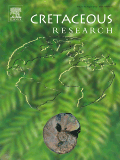
CRETACEOUS RESEARCH
metrics 2024
Connecting Discoveries from the Cretaceous Frontier
Introduction
CRETACEOUS RESEARCH, published by Academic Press Ltd - Elsevier Science Ltd, is a leading journal in the field of Paleontology that has established itself as an essential resource for researchers and professionals delving into the rich tapestry of the Cretaceous period. With its ISSN 0195-6671 and E-ISSN 1095-998X, this journal boasts a prestigious placement in the academic landscape, holding a Q1 rank in the 2023 Paleontology category and proudly positioned at 21st out of 113 in the Scopus ranking, reflecting its impact factor that places it in the 81st percentile. Since its inception in 1980, CRETACEOUS RESEARCH has facilitated a deeper understanding of prehistoric life and its evolutionary processes, covering topics such as fossil discoveries, paleoecology, and biostratigraphy. This journal best serves those seeking to expand their knowledge and contribute innovative findings to the scientific discourse surrounding the Cretaceous era. As it continues to converge into the future until 2025, it remains dedicated to providing an open platform for the dissemination of high-quality research that shapes our understanding of Earth’s geological past.
Metrics 2024
 0.73
0.73 1.90
1.90 1.80
1.80 81
81Metrics History
Rank 2024
Scopus
IF (Web Of Science)
JCI (Web Of Science)
Quartile History
Similar Journals

NAUTILUS
Diving Deep into Ecology and EvolutionNAUTILUS is a distinguished journal published by the Bailey-Matthews Shell Museum, dedicated to advancing the understanding of aquatic sciences as well as ecology, evolution, behavior, and systematics. With an ISSN of 0028-1344, NAUTILUS has played a significant role in the scholarly community from its inception, with publication converged between 1996 to 2015 and 2017 to 2024. Although currently categorized as Q4 in Aquatic Science and Ecology, Evolution, Behavior and Systematics for 2023, the journal has a reputation for publishing high-quality research that contributes to the broader scientific discourse. Researchers and students alike can benefit from the insights provided by NAUTILUS, which remains committed to exploring the intricate relationships within aquatic ecosystems. Its editorial management, led by Dr. José H. Leal, ensures rigorous peer review and academic excellence, making it a crucial resource for those dedicated to discovering the complexities of aquatic and ecological research.
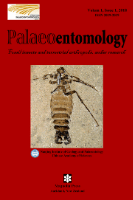
Palaeoentomology
Uncovering the Past: Insights into Ancient Insect LifePalaeoentomology is a leading journal dedicated to the study of fossil insects, fostering a deeper understanding of historical biodiversity and ecosystem dynamics. Published by MAGNOLIA PRESS, this journal provides an essential platform for researchers, educators, and students interested in entomological paleontology and related disciplines. Featuring a wide range of articles that explore fossil records, evolutionary patterns, and paleoenvironments, it serves the scientific community by enriching our understanding of the past. Although currently not open access, the journal prioritizes rigorous peer-review standards and aims to maintain a high impact factor, ensuring that published research meets the evolving demands of the field. Based in Auckland, New Zealand, it welcomes contributions from both established and emerging scientists worldwide, contributing to a vibrant discourse in the study of ancient insects and their ecological relationships.
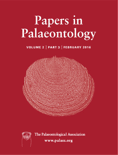
Papers in Palaeontology
Diving into the Diversity of Life Through TimePapers in Palaeontology, published by WILEY, is a premier academic journal dedicated to advancing the field of paleontology. With an admirable impact factor and positioned within the Q1 category in Paleontology for 2023, this journal has established itself as a leading platform for innovative research and discussion, ranking 17th out of 113 in Scopus’s Earth and Planetary Sciences category. Since its inception in 2015, Papers in Palaeontology has aimed to publish high-quality, peer-reviewed articles that explore the diversity of ancient life forms and their evolutionary history. Researchers, professionals, and students alike will find valuable insights and rigorous analyses that contribute to the understanding of our planet’s past. Although Open Access options are not available, the journal provides a wealth of knowledge essential for anyone engaged in the study or practice of paleontology, solidifying its importance in shaping future academic discourse.
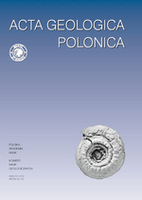
ACTA GEOLOGICA POLONICA
Innovative research shaping the landscape of geology.ACTA GEOLOGICA POLONICA is a distinguished journal published by the Polska Akademia Nauk, in collaboration with the University of Warsaw's Geology Department. Since its inception, it has served as a vital platform for disseminating innovative research in the field of Geology, reflecting a commitment to advancing scientific knowledge in Earth and planetary sciences. With an ISSN of 0001-5709 and an E-ISSN of 2300-1887, this journal provides a rigorous review process and is classified in the Q3 quartile for Geology as of 2023, indicating its growing influence in the discipline. Despite not being open access, the journal facilitates meaningful contributions that span a range of geological topics from fundamental research to applied sciences, thereby enriching the academic landscape. Researchers, professionals, and students alike are encouraged to engage with the valuable findings and discussions contained within its pages, which continue to shape the future of geological inquiry.

Gondwana Research
Illuminating the Path of Geological Research and EducationGondwana Research is a premier academic journal published by Elsevier, specializing in the field of geology, with a robust focus on the geological history and processes of the Gondwana supercontinent. With an impressive impact factor and ranking as Q1 in the 2023 Geology category, it stands as a leading platform for disseminating high-quality research. The journal features articles that advance the understanding of Earth and planetary sciences, making significant contributions to geological education and research. Researchers will find its curated content particularly valuable, as it encompasses a wide array of topics including stratigraphy, paleontology, and tectonics, all relevant to both contemporary and historical geological inquiries. Given its substantial reach and esteemed standing—ranked 5th out of 321 in its field—Gondwana Research plays a crucial role in fostering scientific exchange among global experts. Located in the United States with publication continuity from 1997 to 2024, this journal consistently attracts submissions from leading scientists, ensuring that its readership is kept at the forefront of geological discovery and innovation.
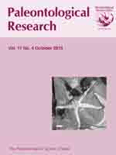
PALEONTOLOGICAL RESEARCH
Charting the Course of Earth's Biological Legacy.PALEONTOLOGICAL RESEARCH, published by the PALAEONTOLOGICAL SOCIETY OF JAPAN, is a prominent peer-reviewed journal that addresses key developments in the field of paleontology, ecology, and evolutionary biology. With an ISSN of 1342-8144, this journal has established itself as a vital resource for researchers and professionals who seek to explore the intricate history of life on Earth, integrating insights into evolutionary dynamics and ecological frameworks. Operating since 1997 and with content converging up to 2023, PALEONTOLOGICAL RESEARCH occupies a notable position, ranked in the second quartile within both Ecology, Evolution, Behavior and Systematics and Paleontology categories. While it is not an open-access journal, its rich repository of studies significantly contributes to the academic community. Researchers and students engaged in the exploration of ancient ecosystems and their implications for current biodiversity are sure to find valuable insights within its pages, reinforcing the journal's importance as a leading platform for disseminating paleontological knowledge in Japan and beyond.

Palaeoworld
Connecting Discoveries to Contemporary Ecological ChallengesPalaeoworld is a leading peer-reviewed journal published by ELSEVIER, focusing on the dynamic and interdisciplinary fields of paleontology, ecology, and stratigraphy. Established in 2006, the journal aims to facilitate the dissemination of innovative research and significant discoveries that enhance our understanding of past life on Earth. With an impressive impact factor and categorized in the second quartile (Q2) for Ecology, Evolution, Behavior and Systematics, Paleontology, and Stratigraphy in 2023, Palaeoworld stands out in its commitment to high-quality scholarship. The journal is indexed in Scopus, ranking #23 in Paleontology and #14 in Stratigraphy, placing it within the top 20% of publications in these categories. As a valuable resource for researchers, professionals, and students alike, it provides unrestricted access to cutting-edge findings, detailed methodologies, and critical assessments of paleo-environmental data. This journal is not only a repository of knowledge but also a platform for advancing discussions that bridge past ecological patterns with contemporary issues.
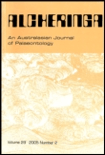
ALCHERINGA
Exploring the Depths of Ecology and EvolutionALCHERINGA, published by Taylor & Francis Ltd, is a distinguished academic journal that has been at the forefront of research in the fields of ecology, evolution, behavior, systematics, and paleontology since its inception in 1975. With an ISSN of 0311-5518 and E-ISSN 1752-0754, this journal serves as a critical platform for the dissemination of high-quality research, contributing significantly to the understanding of biological and geological sciences. Ranking in the Q3 quartile for both Ecology, Evolution, Behavior and Systematics, as well as Paleontology, ALCHERINGA is well-positioned within the academic community, attracting submissions from researchers across the globe. The journal's Scopus ranks further highlight its relevance, particularly its position in the 51st percentile for Ecology and the 50th percentile for Paleontology. Although it does not operate under an open access model, ALCHERINGA remains committed to providing valuable insights and fostering discussions that are essential for the advancement of these vital scientific disciplines. Researchers, professionals, and students are encouraged to explore the profound implications of the studies published within, making it an indispensable resource for anyone aiming to deepen their expertise in these fields.
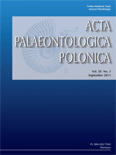
ACTA PALAEONTOLOGICA POLONICA
Connecting Researchers to Earth's Evolutionary StoryACTA PALAEONTOLOGICA POLONICA is a leading scholarly journal in the field of paleontology, published by the Institute of Paleobiology, Polish Academy of Sciences. With its open access model established since 1956, the journal ensures that vital research related to Earth's history and the evolution of life is freely accessible to a global audience. Based in Warsaw, Poland, this journal has garnered a respectable impact within the academic community, currently positioned in the Q2 quartile of its field and ranking #47 out of 113 in Scopus for Earth and Planetary Sciences, reflecting its significance in advancing paleontological research. Covering a wide range of topics related to fossil studies and evolutionary biology, ACTA PALAEONTOLOGICA POLONICA serves as a crucial platform for researchers, professionals, and students alike, encouraging the dissemination of innovative ideas and discussions that contribute to our understanding of past life on Earth. As it continues to publish high-quality articles through to 2024 and beyond, this journal remains integral to the ongoing discourse in paleontological sciences.

PalZ
Exploring Evolutionary Journeys Through TimePalZ is a prestigious academic journal in the field of Paleontology, published by Springer Heidelberg in Germany. With a long-standing history that traces back to its converged years from 1914 to 2024, this journal offers invaluable insights into the evolutionary dynamics and ecological relationships of past life forms. Holding a commendable impact factor and ranked in the Q2 category of Paleontology, it consistently showcases high-quality research that resonates within the scientific community, evidenced by its Scopus rank of #38 out of 113 in Earth and Planetary Sciences. PalZ is committed to open access, ensuring that its rich repository of scholarly articles is readily accessible for researchers, professionals, and students alike. By engaging with the journal, readers will encounter cutting-edge studies that are pivotal for advancing our understanding of paleobiology and the historical patterns of biodiversity.